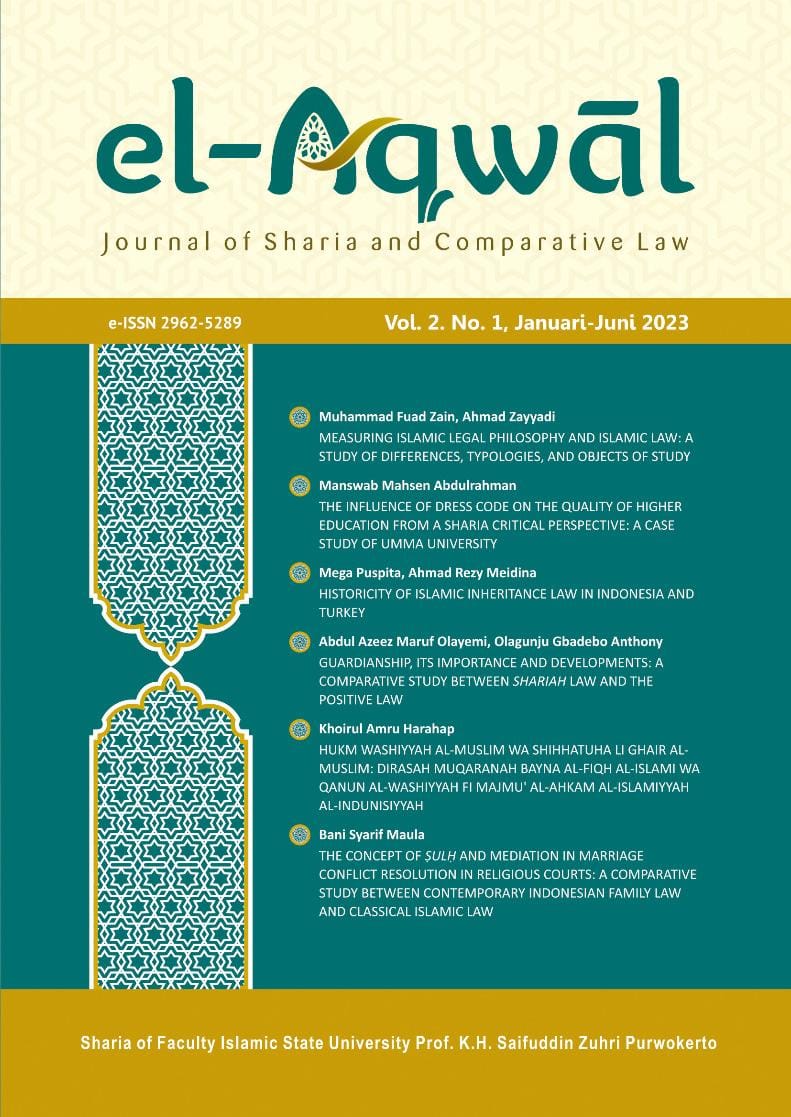Hukm Washiyyah al-Muslim wa Shihhatuha li Ghair al-Muslim: Dirasah Muqaranah Bayna al-Fiqh al-Islami wa Qanun al-Washiyyah fi Majmu’ al-Ahkam al-Islamiyyah al-Indunisiyyah
DOI:
https://doi.org/10.24090/el-aqwal.v2i1.7733Keywords:
Will, Muslim, Non-Muslim, Islamic Jurisprudence, Compilation of Islamic LawAbstract
The debate of Jurisprudence scholars on law and validity of the will of a Muslim to a non-Muslim in the area of harbi, musta’min, and apostate. Whether a will is valid or not depends on the fulfillment of its pillars and conditions. Although the scholars of fiqh do not stipulate the condition of "Muslim" on the testator and the person receiving the will, some of them still prohibit and invalidate the will of a Muslim to non-Muslims in the categories of harbi, musta'min, and apostate. The provisions of the Compilation of Islamic Law (KHI) also do not stipulate the requirement of "Muslim" for the testator and the person receiving the will. Islamic jurisprudence determines that the will of a Muslim to a non-Muslim is permissible and valid in some aspects and not permissible and invalid in some aspects. It is permissible and valid for a Muslim to make a will to a non-Muslim under the category of Dzimmi. It is permissible and valid for a Muslim to make a will to a harbi non-Muslim according to the Shafi'i and Hambali madhhabs; it is not permissible and invalid according to the Maliki and Hanafi madhhabs. It is permissible and valid for a Muslim to make a will to a non-Muslim in the category of musta'min according to the Maliki, Shafi'i and Hambali madhhabs, and according to the most correct opinion in the Hanafi madhhab. The will of a Muslim to a non-Muslim in the category of apostate is permitted and valid according to the Shafi'i and Hambali madhhabs, while the Hanafi madhhab prohibits it and considers it invalid. Meanwhile, the provision of wills in KHI allows and considers valid the will of Muslims to non-Muslims absolutely, because KHI does not limit it with certain limitations such as non-Muslim categories dzimmi, harbi, musta'min, and apostate, as stipulated in Islamic fiqh. Therefore, from the perspective of Islamic fiqh and the provisions contained in the Compilation of Islamic Law, Muslim wills to non-Muslims are both permissible and considered valid. This is because both do not require "Muslim" for the testator and the person receiving the will. However, Islamic fiqh does not allow it absolutely, while KHI allows it absolutely.Downloads
References
Abdurrahman, Muhammad Muhammad Zanati. Al-Ahkam wa al-Adab al-Islamiyah fi Dhau Surah an-Nisa. Kairo: Dar Abu al-Majd, 1996.
Amir, Abdul Latif Muhammad. Ahkam al-Washaya wa al-Waqf. Kairo:Maktabah Wahbah, 2006.
Azzam, Abdul Aziz Muhammad. Buhuts Fiqhiyah ‘ala Madzhab al-Imam asy-Syafi’i: Maudhu’iyah wa Nashshiyah fi an-Nikah wa ath-Thalaq wa al-Washiyah. Kairo: Maktabh ar-Risalah ad-Dauliyah, 1998.
al-Husaini, Muhammad Mushthafa Syahatah. Al-Ahwal asy-Syakhshiyah fi al-Walayah wa al-Washiyah wa al-Waqf. Kairo: Dar at-Ta’lif, 1976.
Ibnu Rusyd. Bidayah al-Mujtahid wa Nihayah al-Muqtashid. Vol 2. Indonesia: Dar Ihya al-Kutub al-‘Arabiyah.
al-Jaziri, Abdurrahman. Kitab al-Fiqh ‘ala Madzahib al-‘Arba’ah. Vol 3. Beirut: Dar al-Kutub al-‘Ilmiyah, 2003.
al-Khafif, Ali. Ahkam al-Washiyyah: Buhuts Muqaranah. Kairo: Dar al-Fikr al-‘Arabi, 2010.
Kompilasi Hukum Islam, dalam: http//www.hukum.unsrat.ac.id
Sabiq, Sayyid. Fiqh as-Sunnah. Vol 3. Kairo: al-Fath li al-I’lam al-‘Arabi, t.t.
Syalabi, Muhammad Mushthafa. Ahkam al-Washaya wa al-Awqaf. Beirut: ad-Dar al-Jami’iyah, 1982.
Usman, Suparman. Hukum Islam: Asas-Asas dan Pengantar Studi Hukum Islam dalam Tata Hukum Indonesia. Jakarta: Gaya Media Pratama, 2001.
Wizarah al-Awqaf wa asy-Syu’un al-Islamiyah. AL-Mausu’ah al-Fiqhiyah. Vol 7. Kuwait: Wizarah al-Awqaf wa asy-Syu’un al-Islamiyah, 1986.
Wizarah al-Awqaf wa asy-Syu’un al-Islamiyah. AL-Mausu’ah al-Fiqhiyah. Vol 22. Kuwait: Wizarah al-Awqaf wa asy-Syu’un al-Islamiyah, 1986.
az-Zuhaili, Wahbah. Al-Fiqh al-Islami wa Adillatuh. Vol 8. Damaskus: Dar al-Fikr al-‘Arabi, 1986.
Downloads
Published
How to Cite
Issue
Section
License
Authors who publish with this journal agree to the following terms: Authors retain copyright and grant the journal right of first publication with the work simultaneously licensed under a Creative Commons Attribution-ShareAlike 4.0 International License that allows others to share the work with an acknowledgment of the work's authorship and initial publication in this journal.












